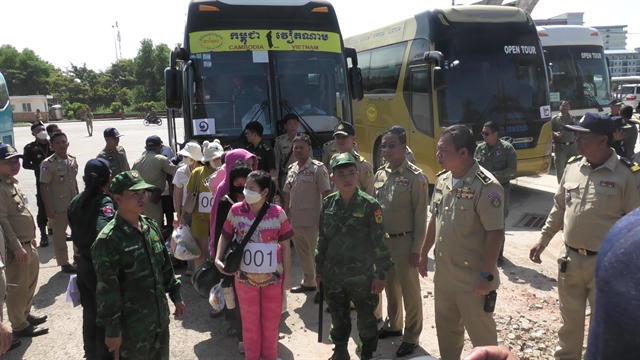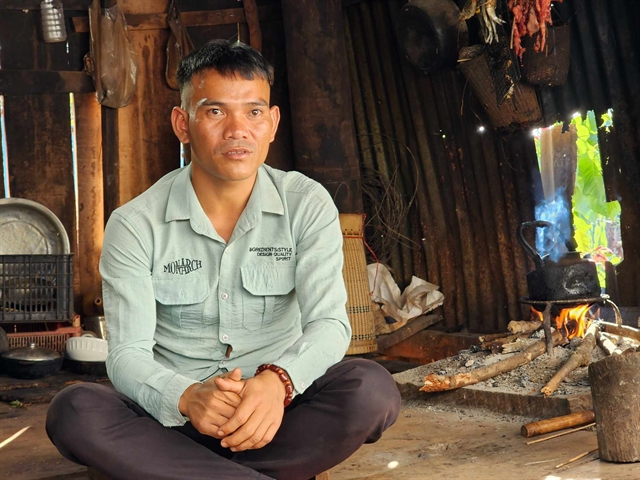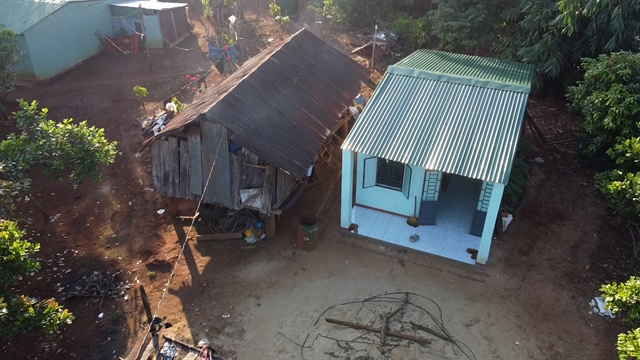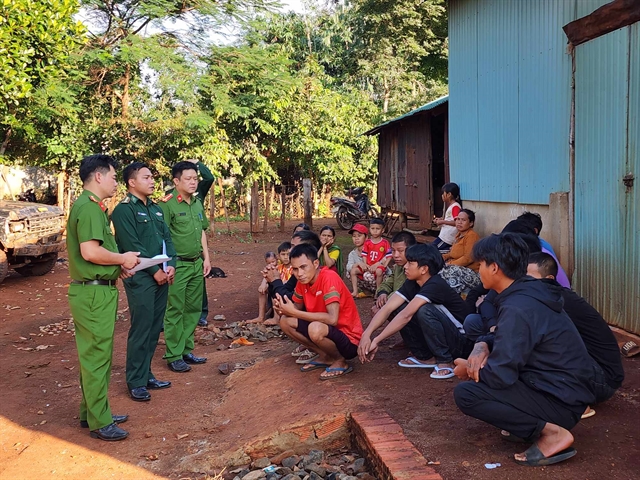 Opinion
Opinion

By Lê Việt Dũng
While the image of traffickers forcibly abducting victims is common, the reality of human trafficking often reveals a far more insidious side. Traffickers often use deceitful promises of “easy jobs with high pay” to lure victims into crossing borders willingly.
One such victim, T.V.T. (name withheld) from the northern province of Sơn La, was rescued and returned to Việt Nam by the end of 2023 after falling prey to traffickers in Cambodia who had offered him the promise of lucrative employment.
 |
| Cambodian authorities repatriate human-trafficking victims to Việt Nam via the Mộc Bài International Border Checkpoint in December 2023. — VNA/VNS Photo |
The ordeal began in January 2023, when T.V.T. came across a Facebook post advertising overseas jobs with monthly salaries ranging from VNĐ20-30 million (US$800-1,200). The recruiter, a man presenting a professional demeanour, painted a rosy picture of guaranteed long-term employment with free accommodation and meals.
Eager to seize the opportunity, T.V.T. followed the man’s instructions and met at a designated place in his district. The recruiter greeted him warmly, offering money to buy new clothes and arranging transport to the supposed job site. Overwhelmed by the man’s generosity, T.V.T. complied and boarded a bus to HCM City, joining nearly a dozen others with similar aspirations.
Upon arrival in HCM City, the group was taken to An Giang Province, where they crossed the border into Cambodia under cover of darkness. Their destination was a secluded house, where armed men awaited them. It was here that the victims were coerced into signing debt agreements of VNĐ100 million ($4,000), ostensibly as a “service fee” to be deducted from their wages.
Those who refused to sign were violently beaten or forced to call family members to pay ransoms. One victim, unable to endure the abuse, contacted his mother, who sold their small forest-edge home and one or two cows to pay for his release.
The remaining victims were confined in a heavily guarded slum and subjected to forced labour. Some were coerced into operating online scams targeting Vietnamese citizens, while others were made to work in casinos under appalling conditions.
Local authorities in Tây Ninh Province, upon learning of the situation, collaborated with Cambodian officials to launch a rescue operation. The victims were repatriated to Việt Nam, their harrowing experiences shedding light on the extensive trafficking networks operating.
The story of T.V.T. is one of many. Similar tactics were used to lure Puih Đại, a 26-year-old man from Ia Grai District in Gia Lai Province. Đại was deceived by a network of traffickers that included Trần Quang Quyết, who himself had been a victim of trafficking.
 |
| Puih Đại. 26, shares the story of torture and abuse during his time in captivity beyond the border. — VNS Photo Lê Việt Dũng |
Quyết had previously been lured to Cambodia with the promise of high-paying jobs. After being forced to work for a gambling company, he was released only when his family paid a hefty ransom.
Quyết returned to Cambodia to work to repay his debts, but he was dismissed after two months. Facing yet another ransom demand of VNĐ90 million ($3,500), Quyết turned to trafficking others as a way to offset his remaining debt.
Quyết used Facebook to contact Cầm Bá Sáu, a fellow villager of Đại, pretending to recruit workers for a computer company in Tây Ninh with promises of monthly salaries of up to VNĐ20 million.
When Sáu declined the offer, Quyết promised him a commission of VNĐ1 million ($40) for each person recruited. Trusting Quyết, Sáu persuaded Đại to take the job, and Đại in turn convinced four other villagers to join him.
Quyết arranged for the group to travel to HCM City, where he notified his contacts of the successful recruitment. However, the company rejected the group upon discovering that they were not qualified for the job. Desperate, Quyết contacted another trafficker, Phan Ngọc Đức, who agreed to smuggle the group into Cambodia.
Đức personally inspected the recruits, agreeing to pay Quyết $700 per person. The group hesitated when they realised something was amiss, but they were coerced with false assurances of “easy, high-paying jobs”. At the border, Đức arranged for motorbikes to smuggle them into Cambodia.
“When we got on the motorbikes, we realised we were being sold to Cambodia but could not resist because we feared they had guns,” Đại later recounted.
Once in Cambodia, the group was sold to a gambling company for $10,000. Those unsuitable for online scams or casino work were subjected to severe physical abuse, including beatings, starvation, and even electric shocks.
Ransoms of VNĐ150 million ($6,000) per person were demanded. Families, desperate to secure their loved ones’ release, sold property and borrowed money to pay reduced amounts ranging from $2,400 to $3,500.
“My sons, Puih Đại and Puih Thái, called home, begging us to send ransom money. We had to sell our farmland and borrow from neighbours to bring them back,” their mother tearfully recalled.
The victims were eventually released in July 2022. Local authorities provided financial aid and vocational training, helping them rebuild their lives. Đại was given a new house and a job as a rubber plantation worker. Quyết and Đức, fearing imminent arrest, turned themselves in to the police.
 |
| Đại's new house (right), a gift from Gia Lai Province authorities, is built next to his previous ramshackle dwelling. — VNS Photo Lê Việt Dũng |
Hồ Quốc Dũng, deputy head of Gia Lai Province’s Social Evils and Anti-Human Trafficking Division, highlighted the importance of public education in combating trafficking.
“Raising community awareness is crucial to preventing traffickers from exploiting the promise of ‘easy jobs with high pay’ to lure victims across borders,” Dũng said.
 |
| Police and border guards inform local people about the common tricks traffickers use to lure their victims. — VNS Photo Lê Việt Dũng |
Former trafficking victims like Đại and Thái have become pivotal in the publicity campaign. By participating in outreach programmes and sharing their personal stories, they empower others to recognise and reject similar schemes.
“People now seek jobs through employment agencies and are cautious about recruitment offers over the phone or on social media,” Dũng said.
Communal police chief Hồ Duy Khanh in Tây Ninh Province said local authorities had engaged former trafficking victims in patrol teams and community meetings.
“These individuals not only help identify suspicious activities but also recount their harrowing experiences of abuse and forced labour across the border, raising public vigilance,” he said.
Efforts to combat human trafficking are ongoing, but as cases like these illustrate, the fight requires vigilance, education, and collaboration between authorities and communities to protect vulnerable individuals from falling into the traffickers’ traps. VNS




